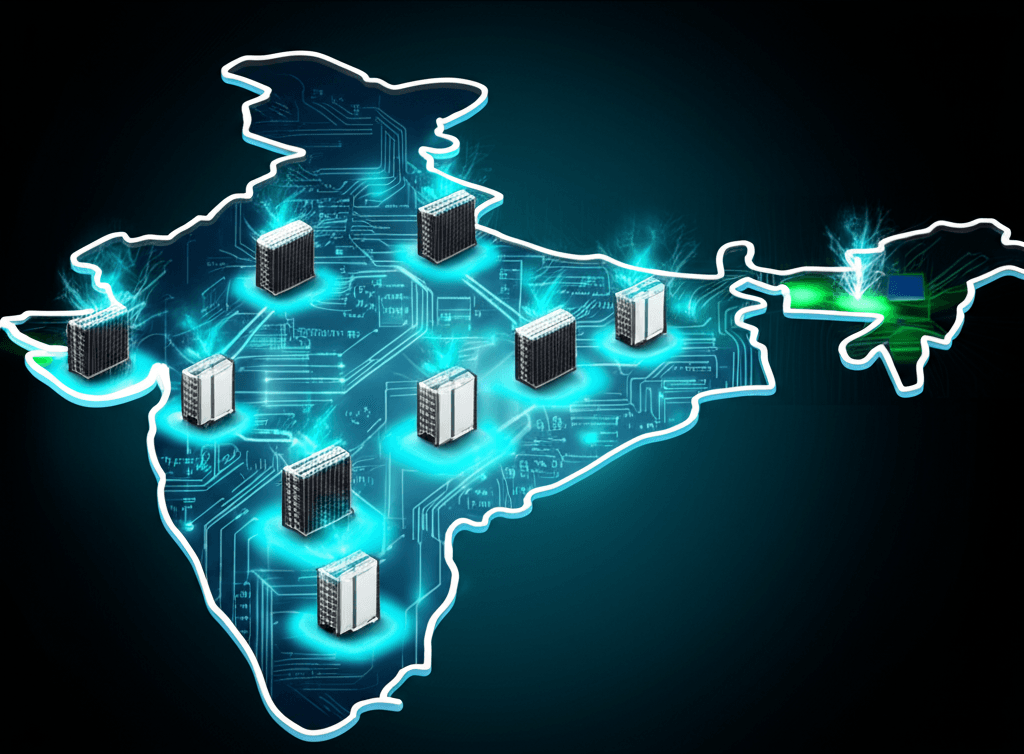NES Data Powers India's AI Revolution with Nationwide Edge Data Centers
New edge and containerized data centers democratize low-latency AI computing across India, fueling a truly inclusive digital economy.
June 26, 2025

A significant shift is underway in India's digital infrastructure landscape as NES Data, a Pune-headquartered data center firm, announces its nationwide launch of edge and containerized data centers.[1][2] This strategic move is poised to revolutionize the country's data architecture, particularly in support of its burgeoning artificial intelligence (AI) ecosystem. By decentralizing data processing capabilities and bringing them closer to the source of data generation, NES Data aims to democratize access to high-speed, low-latency computing resources.[2] This initiative is expected to have far-reaching implications, not just for the technology sector but for the broader goal of creating a resilient and inclusive digital economy that extends beyond major metropolitan hubs into Tier II and remote cities.[1] The move comes at a critical time, as India's data center industry experiences explosive growth, having expanded 288 times in the last eight years to a current valuation of $1.2 billion.[1]
The core of NES Data's strategy lies in the deployment of two distinct but complementary technologies: edge data centers and containerized data centers.[2] Edge data centers are compact, localized facilities positioned nearer to end-users and devices, a departure from the traditional model of large, centralized hyperscale facilities.[3] This proximity is crucial for applications that demand near-instantaneous data processing, such as the Internet of Things (IoT), 5G-enabled services, telemedicine, and autonomous vehicles.[2][3] By minimizing the physical distance data must travel, edge centers drastically reduce latency, which is the delay in data transfer.[2] Containerized data centers, on the other hand, offer a modular and portable solution.[2] These are prefabricated, self-contained units that integrate all the necessary components of a data center—compute, storage, and cooling systems—into a transportable container.[2] Their key advantages are rapid deployment, often within weeks, and scalability, as new units can be added in a plug-and-play manner as demand grows.[2] This flexibility makes them ideal for quickly establishing a presence in new or underserved markets.[3]
NES Data's offering is specifically tailored to meet the intense demands of AI and real-time applications.[1] The company's containerized centers are equipped with Battery Energy Storage Systems (BESS) for sustainable and uninterrupted power, zero-touch operations for efficiency, and hybrid cloud integration for seamless connectivity.[2] A key feature is the ability for enterprises to create their own private AI zones, allowing them to process sensitive data locally, reduce costly data backhaul to centralized clouds, and build more resilient, distributed computing infrastructures.[1][2] Recognizing the unique needs of AI workloads, which are often characterized by high-density computing requirements, these facilities are engineered for superior performance and modular scalability.[1] The company is already developing a new edge data center in Pune and plans to expand its capacity to over 100 MW across India in the next three years, capitalizing on the nation's booming digital economy.[1][4] This expansion is not limited to NES Data; other players like CtrlS Datacenters and Sify Infinit Spaces are also actively deploying edge and containerized solutions in cities like Patna, Lucknow, and Bhubaneswar, signaling a broader industry trend towards decentralization.[3]
The push towards the edge is set to be a democratizing force for India's digital ecosystem. For years, the country's data infrastructure has been concentrated in major metro areas, creating a digital divide and latency issues for users in other regions.[3] By extending state-of-the-art data infrastructure to Tier II cities like Jaipur, Ahmedabad, Kochi, and Vizag, this new model promises more equitable access to the digital economy.[1] According to Umesh Sahay, Founder and Managing Director of NES Data, this decentralization will enable "eco-friendly, stable, and localised data access, even in underserved regions."[1] This shift is critical for fostering innovation at a local level, empowering rural startups, and supporting state governments in their digital initiatives.[3] The availability of low-latency, high-efficiency solutions is the backbone required for India's AI-first ambitions, as generative AI alone is projected to add $400 billion to the nation's GDP by 2030.[5][6] This infrastructure will be crucial for supporting AI applications across diverse sectors such as healthcare, fintech, and logistics.[5]
In conclusion, the launch of NES Data's edge and containerized data centers marks a pivotal moment in India's digital transformation journey. This strategic shift from a centralized to a decentralized data infrastructure model is a direct response to the escalating demands of an AI-driven world. By prioritizing low-latency performance, rapid scalability, and sustainability, this new wave of data centers is set to not only accelerate the adoption of next-generation technologies like 5G and IoT but also to foster a more inclusive digital landscape. As these advanced computing capabilities permeate beyond the traditional metro hubs, they will unlock new opportunities for innovation and economic growth across the country, providing the essential foundation for India to solidify its position as a global leader in the digital and AI economy. The "digital Bharat" envisioned by tech leaders is increasingly becoming a reality, built upon a resilient, distributed, and democratized data infrastructure.[1]